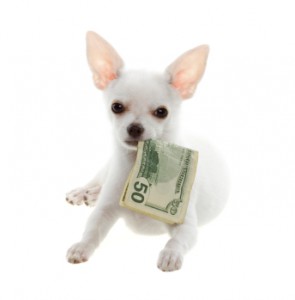Pets when times are ‘ruff’
 They’re irresistible! Cute, cuddly puppies and adorable, fluffy kittens…one look with those lonely, begging eyes, and almost nobody could say, “no.”
They’re irresistible! Cute, cuddly puppies and adorable, fluffy kittens…one look with those lonely, begging eyes, and almost nobody could say, “no.”
Many young adults are choosing to invest in a furry friend, but before you run to the pet store with your check book, make sure to consider the big picture – Pets cost more than a “few bones.” In fact, the average dog racks up a bill or $16,000 over 10 years, and the average cat – $10,000!
Despite these bank-breaking numbers, there are many benefits of owning a dog or cat. If you can’t resist the canine persuasion, there are many ways to minimize the costs associated with caring for a feline friend.
“STAY!” out of pet shops
When choosing the right pet for you, avoid high-cost, high disease pet shops. These establishments often offer “pure-breed” animals with a hefty price tag. Puppies and Kitties from pet shops often get sick, due to poor breeding, inadequate hygiene, or an overall lack of care. Instead, take a visit to your local humane society and consider an animal that really needs a home. Your new critter, and your checking account, will thank you!
To spay, or not to spay
Many people don’t realize the initial health care expenses of owning an animal. Between shots, potential treatment for any illness and costs of spaying or neutering your pet, money can really get tight. Make sure to shop around when choosing a doctor for Spot. Many “ma and pop” vets are more reasonably priced, and will offer a higher level of personalized care for your animal. When Lady starts to become a lady (and flirting with the neighborhood tramp), you’ll need a way to prevent having six more financial responsibilities! Humane societies encourage spaying or neutering Fluffy, and will “baby-proof” your dog or cat at discount prices.
Second-hand Sparky
When you get your animal home, you’ll need to acquire all the necessary supplies – a crate, a collar, a leash, toys and blankets. Unless you’ve invested in Paris Hilton’s precious Tinkerbelle, you pet doesn’t need designer digs. Thrift stores often carry everything your new pooch or puss will need – at a fraction of the cost!
Bone – Appétit, in BULK
Pets need to be fed to grow big and strong, and they need to be fed A LOT! Since an animal is a long-term investment, try buying food, puppy pads and kitty litter from stores that sell these items in bulk. Over time, these marginal discounts will really add up.
Remember the many costs of acquiring and maintaining an animal when deciding on a new pet. If you think that you still can afford a new addition to the family, many of the costs can be reduced with a little planning and substituting. It is possible to keep your animal healthy and happy, without scraping your cash!
